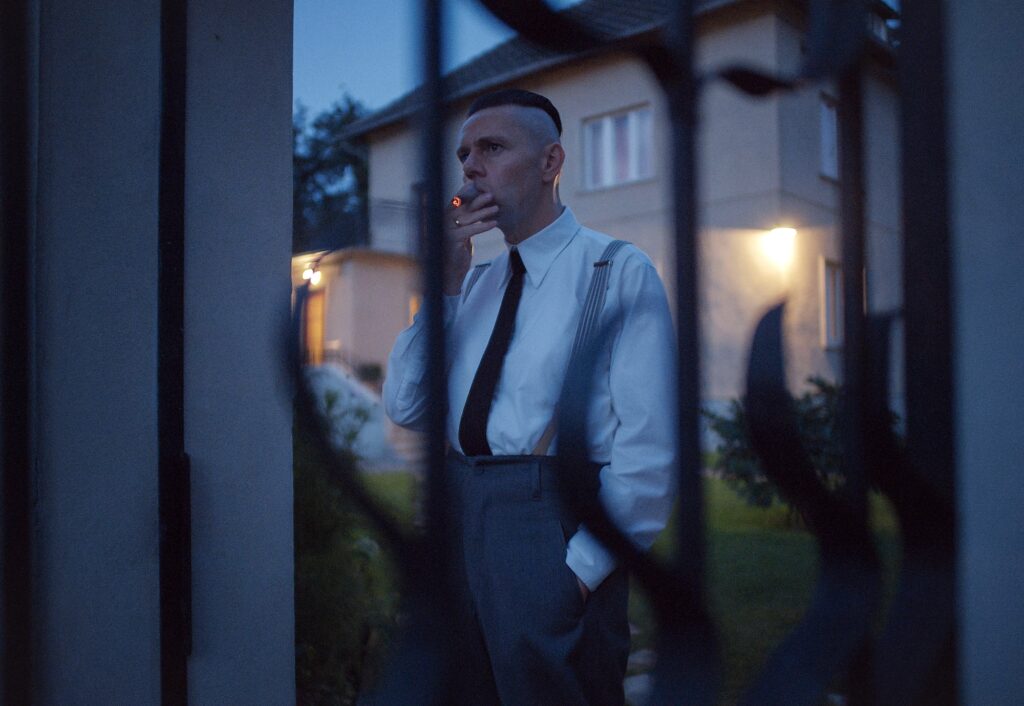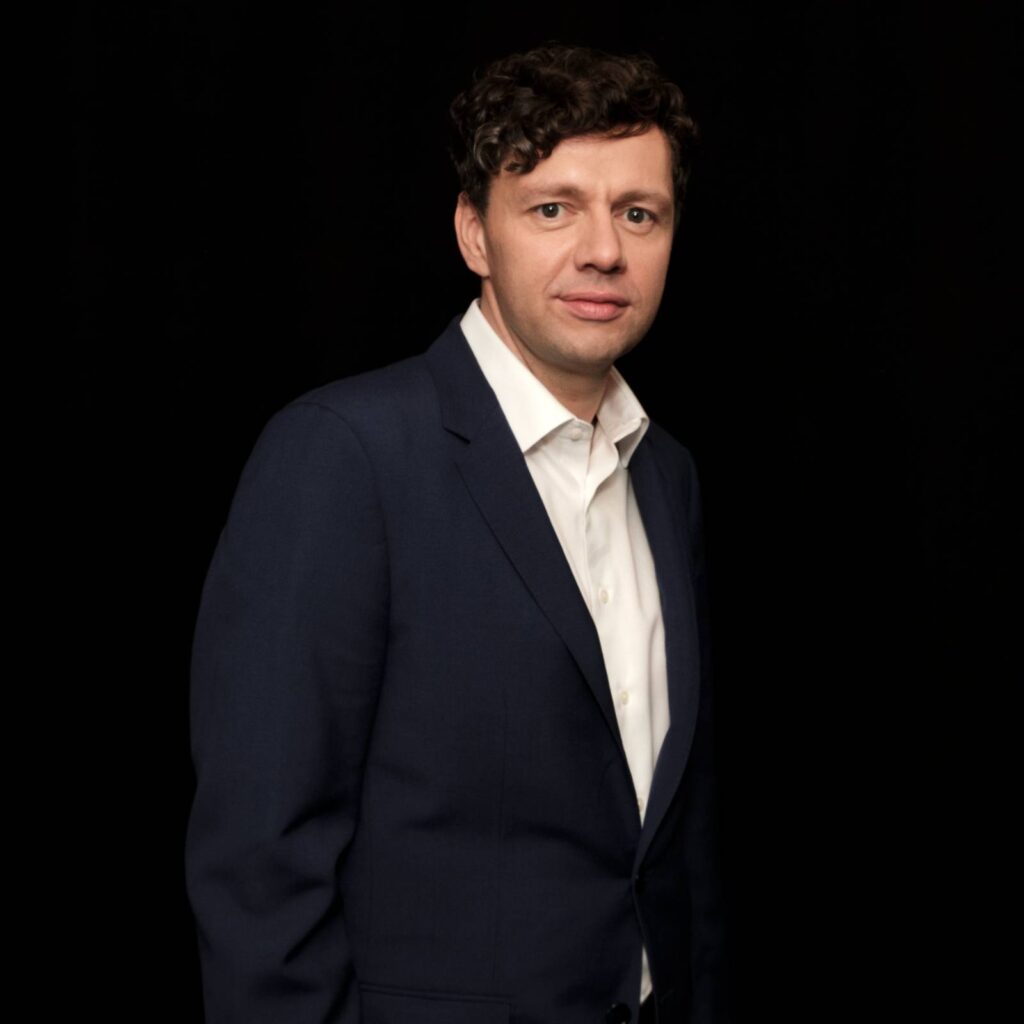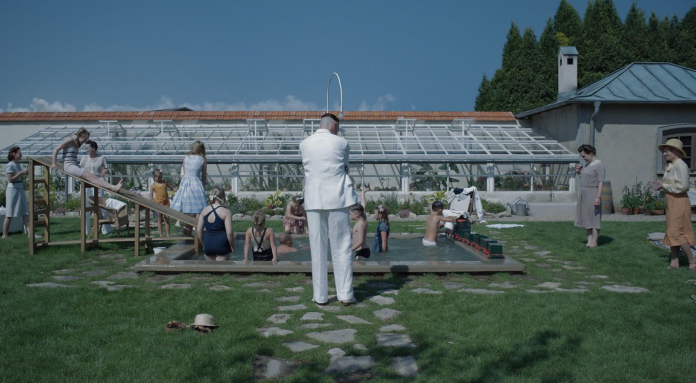Jonathan Glazer’s chilling new drama, The Zone of Interest (see our review here), presents an accumulation of telling details in observing the lives of Auschwitz commandant Rodolph Höss, his wife Hedwig, and their children as he builds a portrait of banal monstrosity. Among these: The Nazis apparently had rock memorabilia-like merch as one scene has Höss wearing a wifebeater emblazoned with the SS logo while cavorting in the Sola River. Then there’s the hair: On the red carpets at Cannes, Toronto International, Mill Valley, and New York Film Festivals, star Christian Friedel and his mop of curly hair cut a striking figure. The impression he makes as Höss is no less vivid as he replicates the man’s fascist style, his hair chemically straightened and shaved on the sides.
“It was embarrassing, that haircut. It was embarrassing to visit the camp with that haircut. I wore a hat; I was embarrassed. And to live in the town for three months with this hair cut was not (comfortable). But it helped me as an actor,” Friedel says during his visit to the Bay Area to attend the Mill Valley Film Festival.
“There were no curls for over a year, that was really hard but helped me to be an important commandant. Maybe sometimes I feel like a king here. I’m a king and Hedwig is queen. She says in the movie, ‘Rudolph calls me the queen of Auschwitz.’”

To capture that psychology of Rudolf and Hedwig (Sandra Húller), British writer-director Glazer (Sexy Beast, Under the Skin) utterly the transforms the Martin Amis novel he is adapting. Höss was not only in charge of the horrors of Auschwitz, he was also one of the architects of Hitler’s Final Solution but while the film touches on that, the emphasis is on the domestic. Most of the film takes place in Höss home, as Rodolph takes care of his children or flirts with his wife and as Hedwig tends her beautiful garden and oversees a staff of domestics. It is a gorgeous home and grounds. Or would be if there wasn’t a barbed wire fence, concentrations camp barracks, and crematorium stacks for a view.
Becoming Höss was a daunting task for the soft-spoken Friedel. An actor and musician—he is a singer and pianist in the band Woods of Birnam—he made his screen debut in Michael Haneke’s 2011 drama The White Ribbon, another drama depicting malevolence. More recently, he portrayed a witness to the rise of Nazism as police photographer Reinhold Gräf, in the Weimar era-set German TV series “Babylon Berlin” (available on Netflix). He shot the latest season of the series just before making The Zone of Interest and describes a sense of dissonance in dealing with the same historical context but from the other side, and with a completely different energy. The Höss character Friedel found the most challenging of his career.
“There are a lot of things still in my subconscious and my body after working on this project for nearly two years,” he says. “To go so deep into the darkness of this character was really intense.”
Before shooting began, Glazer gave Friedel a note which he found invaluable when it came to sinking into Höss’s skin. The director told the actor that when it came to Höss, he should “lie with his eyes” if speaking a truth, and if telling a lie, express the truth through his eyes. Within those contradictions, Friedel found his character.
“We want to see a perpetrator; we want to see an evil person, but we have to see the humanity, the banality of a boring, ordinary father,” he says. “He is a man interested in nature, in horseback riding, and his kids. This was really important. The subtext in my mind was really dark because he’s thinking a lot about his work. He had pictures in his mind but I was not allowed to share this.”
The film’s location only added to Friedel’s sense of verisimilitude. With the exception of one scene that takes place in the building’s basement, Glazer could not shoot in the actual Höss home since a family lives in it. But he found a suitable house nearby, about 100 meters from the concentration camp, by Friedel’s estimation, the view of it ever present, whether shooting a scene or pausing for cast and crew to take lunch or dinner breaks.
“Some days I was able forget where I was, and that surprised me,” Friedel says. “Maybe that was a survival thing.”
Friedel recalls one scene where Höss and Hedwig walk into their backyard, where their children are enjoying a party, playing in the pool, drinking lemonade, and eating cookies. It felt like a real party to the actor but making The Zone of Interest encouraged that sense of reality. Glazer would have up to 10 cameras filming at one time, in the house and on the grounds, hidden. He and his crew monitored the action from next door, leaving the actors unencumbered. When Friedel was performing in one room of the house, he could hear activity going on in other rooms or outside as scenes shot simultaneously and the director gave his cast room for improvisation. Glazer would keep track of all the monitors, the German dialog coming through in one ear and an English translation in the other.

“It was not a shoot; it was a search,” is how Friedel explains Glazer’s method. “Jonathan had a phenomenal script but he was searching: ‘Is there something else? I don’t know. Let’s figure it out.’ Sometimes we only shot one or two scenes per day, so we had time and could make variations. That was amazing to me, as an actor.
“I would do every movie this way; it was a luxury situation. We had time and it was not about which angle is important, ‘Now, it’s time for your closeup.’ Sometimes, it reminded me of when I was young and playing cowboys, thinking, ‘This is an ambush,’ and it felt real… We felt in the moment, making this. Yes, we were here. That’s it for an actor.”
In The Zone of Interest, Friedel plays a monster. But the film never loses sight of the fact that Rudolf Höss is a human being and neither does the actor playing him. In an interview he did at the Toronto International Film Festival, he averred that the film is ultimately, “a portrait of us.” During his Bay Area visit, he expands on that theme.
“I think the most important thing is that it’s a movie about an incredible crime, in historical context, but to me, it’s a modern movie about us. Because human beings do these things to other human beings and it’s not necessary,” Friedel says. “If you’re Black or white, gay or straight, if you are Jewish or Christian or Muslim, in all of us, there’s darkness.
“We have to be aware this darkness exists. This example in its historical context reminds us that we have the ability to ignore atrocities or compartmentalize them. In a way, we are masters of self-deception. Maybe it’s to survive, but the decisions we make define us.”
The Zone of Interest opens at SF’s Alamo Drafthouse and AMC Kabuki this Fri/12, then expands on January 19 to other theaters including SF’s Metreon; AMC Bay Street in Emeryville; Berkeley’s Elmwood, and Oakland’s Piedmont 3.






